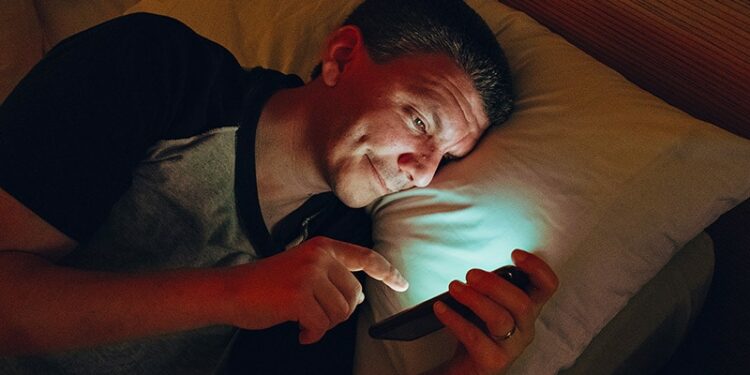[ad_1]
TOPLINE:
Daily use of electronic screens shortly before bed was associated with a 33% higher rate of poor sleep and approximately 50 minutes less sleep weekly. People with evening chronotypes experienced greater disruptions in sleep and were at increased risk for poor sleep.
METHODOLOGY:
- Researchers conducted a cross-sectional analysis of 122,058 men and women who had completed a questionnaire in 2018 as part of the American Cancer Society Cancer Prevention Study-3, in which people from 35 states and Puerto Rico, responded.
- Patients reported how much time they spent using electronic screens in the hour prior to bed, including sleep and wake times, sleep quality, and patient tendency to be active in the morning or evening.
- The researchers examined associations between screen use and sleep outcomes and “morning” or “evening” people; the median age was 56 years, and 80% of the patients were women.
- Researchers calculated mean differences for sleep duration and bedtimes and prevalence ratios (PRs) for sleep quality by the amount of time spent using screens.
TAKEAWAY:
- Over 50,000 patients reported daily screen use before bed and showed a higher rate of poor sleep quality than nonusers (PR, 1.33; 95% CI, 1.27-1.39).
- People who used screens daily experienced less sleep on workdays, losing an average of 7.64 minutes of sleep (95% CI, 6.65-8.63) and also slept less on non-workdays, losing an average of 5.04 minutes (95% CI, 4.03-6.05).
- The effect was stronger among those who considered themselves “evening” people, losing an average of 8.36 minutes of sleep (95% CI, 4.94-11.78), than in “morning” people, who lost an average of 5.64 minutes of sleep (95% CI, 3.98-7.29).
- Daily screen users with evening chronotypes went to bed an average of 15.62 minutes later on workdays (95% CI, 11.93-19.31), while morning chronotypes went to bed 9.33 minutes later on average (95% CI, 7.61-11.06).
IN PRACTICE:
“Our findings strengthen the evidence that electronic screen use and disruptions to sleep duration and quality are not limited to children and adolescents but to the broader adult population as well,” the study authors wrote. “The decrease in quality and duration appeared to be greater among those with a later chronotype and may be due to delayed bedtimes. Continued work is needed to understand the mechanisms though which screen use disturbs sleep.”
SOURCE:
The study was led by Charlie Zhong, PhD, of the Department of Population Science at the American Cancer Society in Atlanta, Georgia. It was published online on March 27 in JAMA Network Open.
LIMITATIONS:
The study’s cross-sectional nature made exploration of daily relationships between behaviors such as physical activity, diet, sleep, and screen use difficult. Screen use was only measured by frequency, without further details beyond weekly use. The study only focused on handheld screens, which excluded devices such as televisions and computers. The researchers were unable to examine sleep patterns around retirement.
DISCLOSURES:
The authors reported no relevant financial disclosures.
This article was created using several editorial tools, including AI, as part of the process. Human editors reviewed this content before publication.
[ad_2]
Source link : https://www.medscape.com/viewarticle/screen-time-before-bed-linked-reduced-sleep-duration-adults-2025a10007m5?src=rss
Author :
Publish date : 2025-03-31 10:00:00
Copyright for syndicated content belongs to the linked Source.














